Continuing the tradition at the Education Hub of Pakistan – Jamshoro, Mehran University of Engineering & Technology (MUET), an International Multi Topic ICT Conference 2018 (IMTIC ’18) organized with Technical Collaboration and support of Innovation and Entrepreneurship Centre (IEC) MUET, IEEE Inc USA Karachi Section, Erasmus Mundus LEADER (Leading Mobility between Europe and Asia in Developing Engineering Education and ReSearch), Erasmus Plus CAPRIO (University of Malaga, Spain), and Centre for Telecommunication Infrastructure (CTIF) GLOBAL CAPSULE, Future Technologies for Business Ecosystem Innovation ( FT4BI ), Aarhus University, Denmark. Highlighting the mega event, Prof BS Chowdhry, Chief organizer of the conference informed that IMTIC mission which started its journey 10 years ago and now completed a decade of history to cherish. We started our 1st International Multi Topic ICT Conference voyage in 2008 in collaboration of Aalborg Univ Denmark and the rest is history. IMTIC gave us Chance to avail EU Erasmus Mundus Programs “Mobility for Life”, StrongTies, INTACT, LEADERS, CAPRIO, Erasmus Plus ICM. More than 200 UG, Masters and Phd students, faculty /staff members availed fully funded exchange visits from 1 month to 3 years. IMTIC gave us chance to publish our Conference Proceedings in Springer CCIS series. IMTIC gave us Chance to organize collaborative conferences in other countries such as Spain, Ireland, Denmark, and Nepal. I am very happy to share huge participation in IMTIC over the last decade: More than 30 International speakers from USA, UK, Sweden, Denmark, Italy, Malaysia, China, Canada, Germany, Cyprus, Romania, UAE, Qatar delivered keynote, more than 70 Invited speakers from various universities within country shared their research work and Chaired Technical sessions, more than 30 national and International Tutorials have been organized during IMTIC, UG students and PG students participation in Poster session encourages them how to embark upon research work and PhD symposium is another aspect of IMTIC value addition.
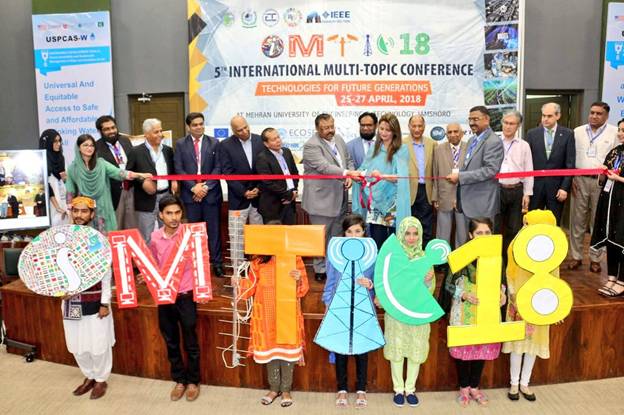
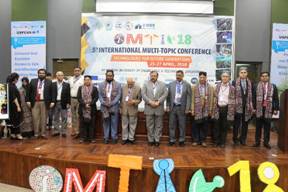
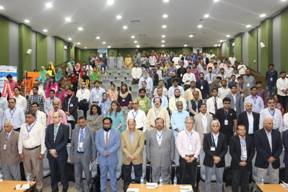
The goal of the PhD Symposium is to provide a supportive atmosphere for PhD students to present and receive feedback on their on going work. Students at different stages in their research gets an opportunity to present and discuss their problem statements, goals, methods and results. IMTIC has also resulted in carrying out joint PhD supervision. Moreover, students learn volunteering themselves. As an IEEE volunteer, they can take pride in participating in activities that interest them, while expanding their knowledge of IEEE, gaining valuable management and leadership skills, and connecting with others in your profession. In his welcome address, Prof Dr Mohammad Aslam Uqaili, VC MUET said that IMTIC’18 has raised awareness of state of the art research, locally and internationally and provided a platform for Pakistani researchers to express their ideas and research interest and effectively developing professional relations with the experts working in their areas. This flagship event having theme of `Technologies for future generations`, has helped in developing the professionalism of ICT by considering quality standards, best practice, training & development for faculty and students. Due to technical sponsorship of IEEE, it has provided the opportunity to publish research in IEEE Xplore. He emphasized the need of indigenous research in Advanced technologies which have significant impact on economy & national security. He congratulated all the IMTIC’18 team, the researchers and organizers and expressed his gratitude for making it promising. The Chief Guest of the occasion, Prof Dr Hiroyuki Sato of University of Tokyo Japan talked about advanced technologies that had dramatically altered life. In his keynote “Internet Trust: Design and Deployment” he presented that as the Internet has become pervasive, the cyber-physical world has obtained its ground in human lives. A problem in the Internet is that all entities in the Internet can be hypothetical, meaning that we do not need any “real” entity in the interactions in the Internet.
This kind of anonymity sometimes causes crimes including theft, fraud and spoofing in worse forms than those in our physical society. For about thirty years, computer science has provided technologies of encryption that have enabled us to communicate in secure ways, and to authenticate the counterparts in the Internet. This was the first lodgment for establishing trustworthy communications. Particularly, we can say that we owe the success of e-commerce to SSL. In order to establish trust in the Internet, we must consider how we design assurance levels, which is a challenge of technologies including risk analysis, and how we deploy the framework of trust, which is rather a challenge of social systems. Various talents for security, audit, privacy and legislation have been and are being collected to establish a framework of trust. That is, we are witnessing the emergence of modern trust engineering for the Internet. We must review the Internet trust for various fields in view of technologies and social systems, and may discuss its future directions. Guest of honour and keynote speaker Prof Samir M. El-Ghazaly, from University of Arkansas USA`s said advanced technologies dramatically altered life as they impacted the way people performed daily functions. He said they had significant impact on economy and national security. “Scientific research” is not a luxury that only developed countries could afford. It is a vital necessity for every modern society. It is even more essential in the developing countries and for societies aspiring to catch up with advancement,` he said. IEEE Karachi Section Chair Prof Dr Shahid Shaikh appreciated quality of papers submitted in the conference. He said organizing committee was only able to accept around 34 technical papers out of the total 200 to maintain a high technical standards. This represents an acceptance rate of less than 20 per cent. He said the conference brought researchers and industrialists together to bring out solutions to problems being faced by this modern society of social media. Others who also spoke on various topics regarding Design and Optimization of New Generation of Optical Sensors, smart grid, energy solutions, Big Data Management, Machine learning, Power Electronics, Robotics and UAVs social media problems and their solutions, included Prof Dr B.M.A Rahman of City University UK, Dr Tariq Masood of University of Bath United Kingdom, Prof Dr Mohammad Shafry Mohammad Rahim of Universiti Teknologi Malaysia, Dr Fauzia Abro,City University UK, Dr Nadia Yasir Qadri, COMSATS Taxila, Dr Kashif Nisar, University Malaysia Sabah, Malaysia, Dr. Lorenzo Luini, Politecnico di Milano, Italy, and general manager (technical) Dr Mohammad Yasir Qadri. Prof Dr Manzoor Hussain Soomro, President, ECO Science Foundation, Islamabad was chief guest at the Concluding ceremony. On this occasion Prof Soomro congratulated organizing team of Mehran University of Engineering & Technology (MUET) Jamshoro- Pakistan for organizing yet another International Multi Topic ICT Conference 2018 (IMTIC ’18) and that too in collaboration with numerous national and international organizations and industry. He mentioned that this great seat of learning and innovation and developing cooperation and collaboration, and promoting synergies for pursuing common global goals in line with the UN Agenda-2030 for the wellbeing of people at large, is in itself a great achievement by the MUET. The IMTIC’18, the 5th conference in a row by MUET is heartening and bound to bring together diverse expertise and entrepreneurs for promotion of cooperation and collaborations. Economic Cooperation Organization Science Foundation (ECOSF)- a 10 country Inter-Governmental Organization feels pleased to be one of the support organizations of the conference and I congratulate MUET and its dynamic team led by Professor M. Aslam Uqaili and the IMTIC Champion Prof. B.S. Chowdhry for continuing the great tradition. This is “the Development Revolution” of the developing world! And besides huge infrastructure projects, of which Pakistan is a gateway, the role of ICTs is overarching and of utmost importance. IMTIC’18 is therefore very timely and should lead to newer collaborations for the global good based on the Digital Revolution of the 4th Industrial Revolution. Earlier, Pro Vice Chancellor Dr Tauha Hussain Ali welcomed the Chief Guest Dr Soomro and eminent scientists and technologists from around the globe. The conference shared an understanding of technology and its applications with higher education personalities from all over the world. He further quoted that it is every one’s desire that Science, Technology and Engineering professional within our country find indigenous solution of the local industry problems. In order to encourage our youth, a poster competition, and a Ph.D. Symposium have made part of the events. Two parallel sessions including Innovation and entrepreneurship were also organized at MUET ZAB Campus Khairpur. Highlighting the importance of event, prof Dr Mukhtiar Unar, Pro Vice Chancellor MUET ZAB Campus said IMTIC’18 is a celebration of achieving academic and research goals. Five years back it coincided with the Golden Jubilee of MUET, Jamshoro; a remarkable journey that started fifty-five years ago for excellence in academic pursuit. In fact, it has become an auspicious and prestigious event for researchers, professionals, and academia. The conference has brought industry-academia collaboration; a phenomenon that is vital for the technological development of a country. IMTIC’18 aimed to bring together a wide spectrum of international experts to facilitate experts’ collaboration and knowledge transfer. It also facilitated a dialogue between major industry players, entrepreneurs and academia to help create a roadmap for the development of tangible research environment in the country. We feel honoured that MUET, Shaheed Zulfiqar Ali Bhutto Campus, Khairpur Mir’s has become part of IMTIC’18. The poster competition was inaugurated by Mr Javed Memon, Director HEC Regional Centre Karachi. There were more than 40 posters participated by students of several universities. Prof Dr Faisal Karim Shaikh, Conference Chair shared the data of IMTIC18. Around 200 papers were submitted by researchers through online EasyChair system. With so many papers to choose from, providing a conference program with a high level of technical excellence became a task that was challenging and time consuming, but ultimately a very rewarding one for the Technical Program Committee. The Technical program Committee focused on two aspects while selecting the technical paper first to provide forum for bigger number of participants from Pakistan and all over the world through presentation and discussion of the relevant areas from vast range of Information and Communication Technologies (ICT) disciplines reflecting the rapidly evolving technology we are witnessing today. Second to maintain a reasonable technical standard by selection of around 34 technical papers which represents acceptance rate of less than 20%. All the papers underwent a rigorous review process with each paper receiving at least 2 reviews. The review process included several stages including TPC member reviews, an on-line discussion among the reviewers, TPC lead summary recommendations, and additional reviews (as needed). The conference program has been structured with several parallel-track sessions for presentation of papers, a PhD Symposium and a Poster Session. The program also includes 22 keynote invited speakers and guest speakers renowned experts in the field, and 8 parallel thematic session and 7 tutorials. This event would not have been possible without the enthusiastic and hard work of a number of colleagues. This event would not have been possible without the enthusiastic and hard work of a number of colleagues. He expressed his gratitude to the General Chairs, for their assistance through the whole process, and International Steering Committee members for their supportive guidance. . He thanked HEC, IEEE Karachi Section and other sponsors for their financial and technical support. The event participation was very huge. More than 500 participants including delegates, authors, researchers, postgraduate and undergraduate students, IEEE Executive Committee members, and industry professionals participated in the event.
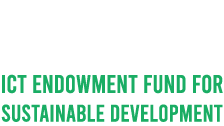
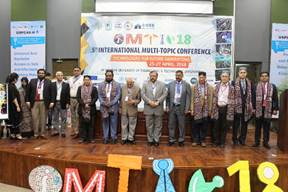
Leave a Reply